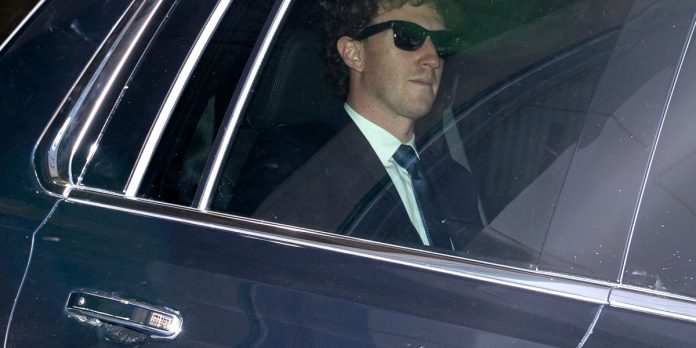Mark Zuckerberg testified for a third day in the Federal Trade Commission’s antitrust trial, stating that ByteDance Ltd.’s TikTok posed a “highly urgent” competitive threat to Meta Platforms Inc. when it emerged in 2018.
“We observed that our growth slowed down dramatically,” Zuckerberg, the Meta chief executive officer, said Wednesday. “It was highly urgent, this has been a top priority for the company for several years.”
The FTC is pressing Zuckerberg to revisit the company’s struggle to keep up with the mobile app boom in the previous decade, leading to the acquisitions of Instagram and WhatsApp over 10 years ago and the launch of Reels video product for Instagram in response to TikTok in 2020.
The FTC wants Meta to sell the apps as it tries to portray Zuckerberg as an executive who illegally monopolized part of the social media market by purchasing companies instead of competing with them. Responding to Meta’s lawyer Mark Hansen, he can tell his story without pushback.
“People will be sharing in new ways in five years, than what is happening today,” Zuckerberg said.
Zuckerberg stated that Meta competes with platforms like Google’s YouTube, Apple Inc.’s iMessage, Elon Musk’s X, Telegram, Microsoft Corp.’s LinkedIn, and others. The FTC argues that Meta only competes with Snap Inc.’s Snapchat in the narrow market of sharing information with friends and family.
‘Network Effects’
The FTC’s case involves the technical concept of “network effects,” meaning that the more users companies like Meta have, the more likely they are to retain a dominant position because people are unlikely to switch to a service used by few people.
US District Judge James Boasberg questioned Zuckerberg on the relevance of network effects during the trial, asking how much it matters if friends are on a particular platform if users can send content out of that platform.
Zuckerberg stated that it doesn’t matter much, as these apps now primarily serve as discovery engines, allowing users to take content to messaging engines.
If the FTC succeeds, a spinoff of Instagram and WhatsApp could disrupt years of integration between the apps and potentially erase hundreds of billions of dollars in Meta’s market value.
Bigger Company
Under questioning by Hansen, Zuckerberg disputed the FTC’s claim that Meta acquired Instagram to suppress a competitor. He highlighted that Instagram would not have grown to its current extent if it had remained independent, stating that the service has become more vibrant as a result of the acquisition.
Zuckerberg explained that taking a small online platform to a billion users requires the support of a larger company, citing examples like ByteDance Ltd.’s TikTok and Google’s YouTube.
Zuckerberg recounted how Snap turned down a $6 billion offer from Facebook in 2013 and suggested that service would have grown more had it joined his company.
In his testimony, Zuckerberg addressed his past statements in internal communications and emails, acknowledging a 2013 email where he blocked advertising for messaging apps and stating “only the paranoid survive” when evaluating competitive threats.
Matheson, the FTC lawyer, displayed an email from 2018 in which Zuckerberg expressed concerns about a possible breakup of big tech companies, indicating a potential need to spin out Instagram and WhatsApp in the future.
This story was originally featured on Fortune.com




